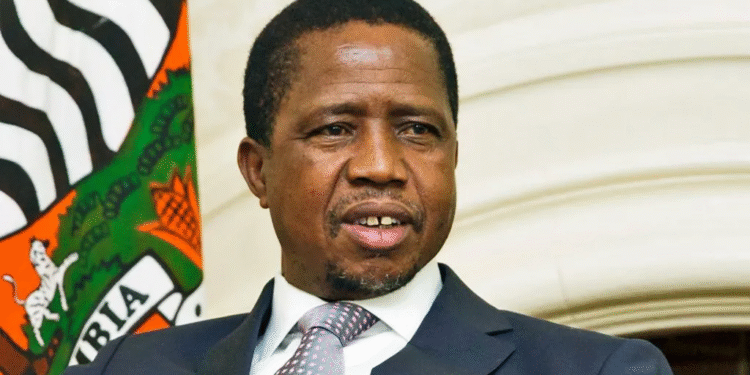Tensions have escalated in Zambia following the death of former President Edgar Lungu, as a bitter row between his family and the government continues to stall funeral plans.
Lungu, who died last week at the age of 68 while receiving treatment in South Africa, reportedly left strict instructions that his political rival and successor, President Hakainde Hichilema, should “not be anywhere near” his body.
Family spokesperson and lawyer Makebi Zulu made this revelation on Thursday, further complicating the Zambian government’s efforts to organize a state funeral. The government had planned to repatriate Lungu’s body on Wednesday but was forced to delay the process due to disagreements with his family and his party, the Patriotic Front (PF), over the nature and leadership of the funeral proceedings.
Lungu and Hichilema were long-standing political opponents, with Hichilema defeating Lungu in the 2021 presidential election after five failed attempts. Since then, relations between the two camps have remained strained.

In a national address on Thursday evening, President Hichilema avoided direct reference to Lungu’s reported wishes but made a plea for national unity.
“This is a time of collective grief,” he said. “Let us put aside our differences and allow the people of Zambia to bid farewell to their former president with the respect and honour his office deserves.”
Despite Lungu’s status as a former head of state, his family insists on a private funeral that honours his personal directives. In a video message from South Africa, Mr Zulu stated that “all logistics” were in place to fulfil Lungu’s desire for a private burial, emphasising that the family did not want Hichilema involved.
“The government is behaving as though the family has no say,” Zulu said. “But it is our responsibility to ensure that the conscience of the deceased is not betrayed.”
Meanwhile, Foreign Affairs Minister Mulambo Haimbe, who led a government delegation to South Africa for talks with Lungu’s widow, Esther, and daughter, Tasila, said the funeral of a former president was a matter of national significance.
“We must work together to give our former president a fitting send-off,” Haimbe said, adding that consultations were ongoing to ensure the “smooth repatriation” of Lungu’s remains.
The dispute has created confusion among many Zambians, with parallel announcements about mourning arrangements. The government declared a seven-day national mourning period starting Saturday and designated a state-owned lodge in Lusaka as the official mourning venue. However, the PF party urged its supporters to gather at its headquarters instead, rejecting the government’s arrangements.
Legal experts have weighed in on the row. Constitutional lawyer John Sangwa told the BBC that the situation highlighted the urgent need for Zambia to establish a legal framework to manage the funerals of presidents and former presidents.
“In the end, the family’s wishes should be respected,” Sangwa said.
Lungu, who ruled Zambia from 2015 to 2021, had remained politically active after his electoral defeat and was considered a key figure in the PF. He was reportedly preparing for a political comeback, but the Constitutional Court ruled in 2023 that he had already served the maximum two terms allowed by law, disqualifying him from contesting future elections.









